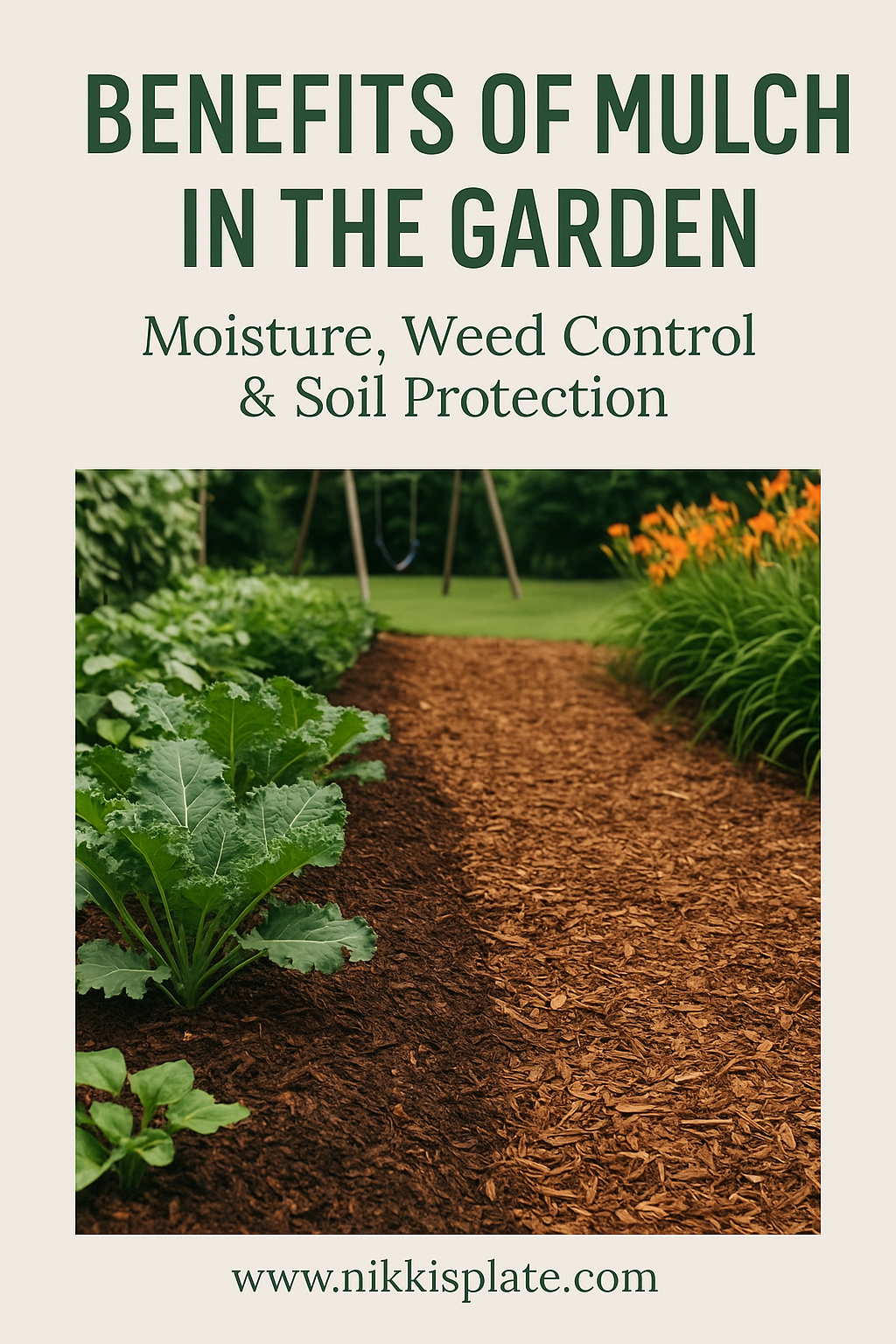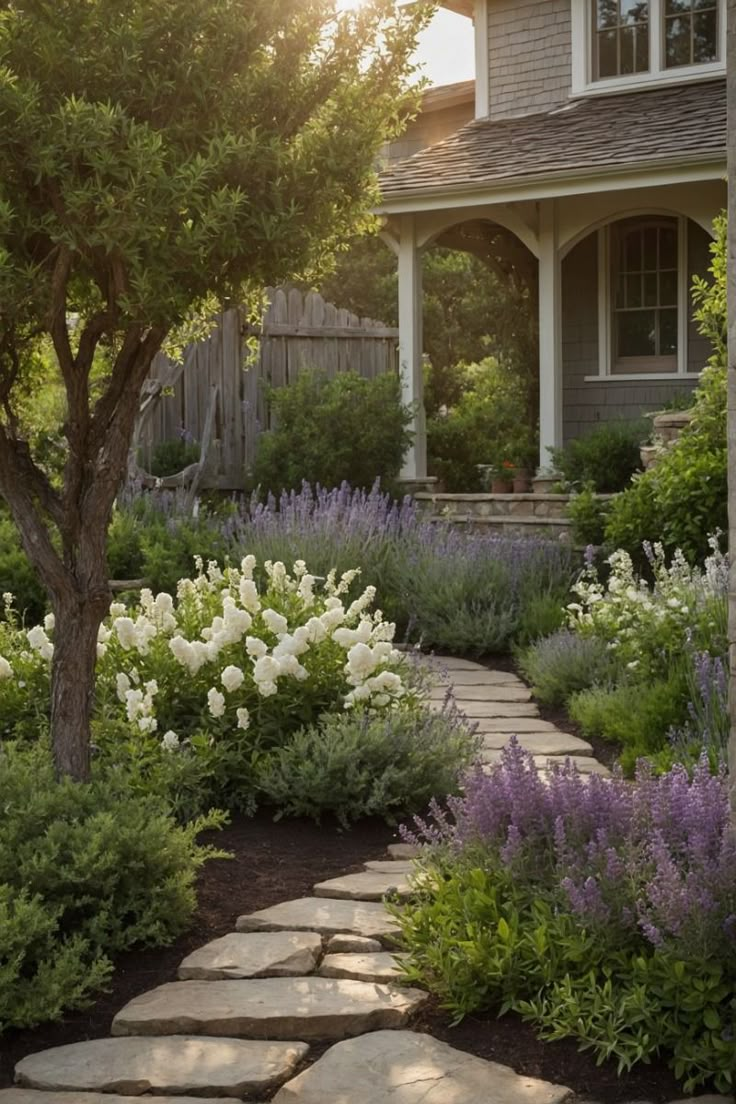Discover the top benefits of mulch for your garden, from moisture retention and weed suppression to soil enrichment and erosion control. Learn which types of mulch work best for vegetables, flowers, herbs, and trees so you can create a thriving, low-maintenance, and beautiful outdoor space.

Disclaimer: this post may contain affiliate links, and every purchase made through these links will give me a small commission (at absolutely no extra cost for you!) AS AN AMAZON ASSOCIATE AND REWARDSTYLE MEMBER, I EARN FROM QUALIFYING PURCHASES. See Privacy Policy for additional info.
Mulch. If you’re looking for a healthier garden, mulch is your friend. With it, you can create a glorious garden with specific ‘enhanced’ areas so that there’s enriched soil, pests will be deterred, and water conservation will be up to standard!
Moreover, your kids will be able to play freely and safely, plus while you’re in the garden, the place will look so much nicer (more ‘premium) and the peace/tranquility levels will be off the charts.
And no, it doesn’t matter whether your garden is big or small, or if you’re cultivating a bed of roses, or a specific herb – mulch is always the right choice. And that’s what this article is all about. We’ll go over all the benefits that mulch brings to your garden and what type of mulch is best for your needs.
1. The Drought Defense
The Science: Mulch has the natural ability to shield soil from the elements, and studies show that mulch retains up to 80% more moisture than bare earth. In warmer summers, moisture retention is important. Hardwood mulches tend to break down more slowly, making them ideal for water conservation.
Practical Tips
- Apply 3 inches of mulch for optimal water retention.
- Best mulch to use: Straw (good for vegetable gardens) or shredded bark (for ornamental beds).
- Watch out for: Over-mulching (more than 4 inches can suffocate roots).
Fun tip: Mulch is decorative yet functional. Try to introduce a swing in the centre of a mulch patch so there is a soft landing if a child falls or trips. A backyard where your kids will flourish, and so will your plants! Consistent moisture to feed your herbs and a reduction of intrusive weeds mean more fun, less upkeep.
2. Weed Suppression
Why It Works: As mulch blocks sunlight from reaching seeds, your weeds won’t germinate. No growth means no weeds and a less labor-intensive garden.
Top Mulches to Use
- Cocoa bean hulls: Smother weeds and smell like chocolate (toxic to dogs – avoid them if you have pets).
- Leaf mold: Free if you rake autumn leaves.
Pro Tip: If you layer newspaper or cardboard under mulch, it offers an extra biodegradable weed barrier. Beware of artificial mulches made with plastics; your results will not be the same.
3. Free Fertilizer to Enrich Your Soil
The Science: When organic mulch starts to break down, it releases nitrogen, potassium, and microbes into the soil. According to the USDA, this process can reduce the need for synthetic fertilizers by 50%.
Best Nutrient-Boosters
- Compost: Speeds up soil improvement (reapply every 3 months).
- Grass clippings: High in nitrogen (use thin layers to prevent matting).
Caution: If you are using fresh wood chips, they can temporarily deplete nitrogen, so be sure to age them for 6 months before using.
4. Root Protection
Weather Protection: If you live in a region such as Pennsylvania, where the climate is very hot in summer but very cold in winter, you will need to determine which mulch will work best for your needs.
When you look up ‘mulch near me’ online and find a local supplier, be sure to ask them about which product will be best at keeping soil cooler in hot weather and insulating roots from frost in winter. Alternatively, if you are in California, you might need something for humid but dry climates.
5. Prevent Erosion
Sometimes, when your yard is quite hilly, you face erosion issues. Creating a protective layer of mulch can help reduce the impact of climate change, such as rain and wind.
A great benefit is that the protective layer can slow down runoff, which gives the soil a chance to absorb the moisture and helps reduce erosion.
Bonus Benefit: Prevents soil compaction from foot traffic in high-traffic areas.
General Tips When Using Mulch
Which Mulch Works Where
- Straw: Veggie Beds
- Hardwood Chips, Ornamentals: Trees and paths
- Pine Needles: Acid-Loving plants
- Compost: Soil Health
Pathways lined with mulch are not just functional, but a place for children to play, pets to romp, giving them a safe, tactile space to explore, dream, and play. Jade plants bordered by black mulch and aromatic herbs fill the air with wonderful smells. Choose what appeals to your senses and the look of your garden.
Mistakes to Avoid For a Thriving Garden
- applying too much mulch
- using the wrong type
- neglecting soil preparation
- failing to refresh mulch
- placing it too close to plant stems
- ignoring weeds
- choosing the wrong season
- neglecting the quality of the product
Any of these could negatively affect your garden, so check with the experts.
Related: Vegetable Garden Layout Ideas

FAQ: Benefits of Mulch in the Garden
Q: What is the main benefit of mulch in a garden?
A: Mulch helps retain soil moisture, suppress weeds, protect plant roots, and enrich soil as it breaks down. It’s one of the easiest ways to keep your garden healthy with less maintenance.
Q: How thick should mulch be applied?
A: For most gardens, apply about 2–3 inches of mulch. Avoid piling more than 4 inches, as this can suffocate plant roots and trap excess moisture.
Q: Which type of mulch is best for vegetable gardens?
A: Straw, compost, or shredded leaves are best for vegetable gardens because they decompose quickly and improve soil fertility.
Q: Is mulch safe for pets and children?
A: Most natural mulches are safe, but avoid cocoa bean mulch if you have dogs since it can be toxic. Mulched areas also provide soft, safe play surfaces for kids.
Q: How often should mulch be replaced?
A: Organic mulch should be refreshed every 1–2 years, depending on how quickly it breaks down. Compost may need topping up every few months.
Final Thoughts on the Benefits of Mulch
Before you start creating/redoing/upgrading your garden, first make a nice cup of coffee, and then get a pen and a piece of paper. Firstly, you want to make a list.
What are your needs? Which kind of plants do you want? How do you want to design your garden? What’s the layout? Will you be using native plants, flowers, or herbs? Things like that. You have to make sure that the end result is what you want and it’s what’ll make YOU happy. Once you’ve sorted that, throw mulch into the mix.
Make sure you’ve picked the right type of mulch for your garden (if you’re still unsure, check with your local mulch supplier). Make sure your garden reaps all the natural benefits mulch provides throughout all seasons.
Happy gardening!











Leave a Reply